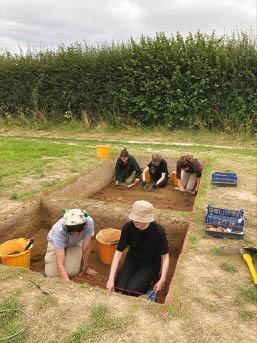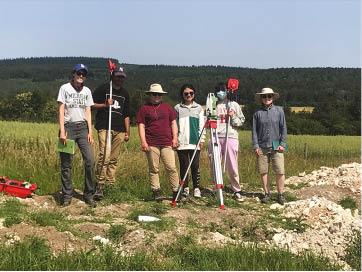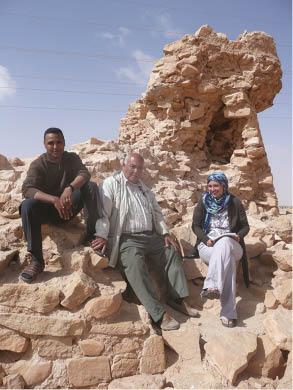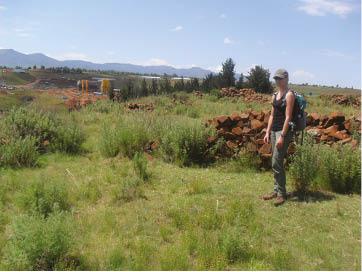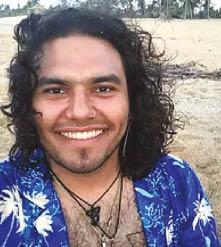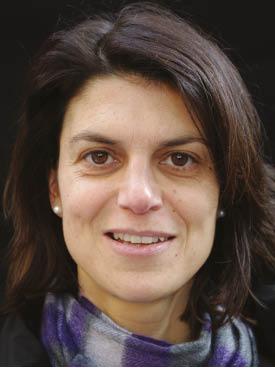Welcome to the Director’s report for the UCL Institute of Archaeology and to Archaeology International for the academic year 2020–21, which was another challenging year for us. Our community has worked tirelessly to develop innovative forms of teaching and learning activities to provide our new and returning students with the highest quality education and pastoral support for which we are renowned, albeit that some aspects of the student experience have had to be delivered quite differently. Our staff and students have dedicated their efforts to keeping things going and carrying on regardless, and I offer them my sincerest thanks.
The 2020–21 academic year began with an ‘online-first’ approach, combined with some face-to-face, socially distanced small group seminars, and lab- and practice-based teaching (Figure 1). Concurrently, home starter kits for students undertaking conservation, ceramic technology and photography courses were issued. With the introduction of a second national lockdown in January 2021, all activities had to move online. Some of the central UCL campus remained open, but our Gordon Square building (and those of other UCL departments) was closed, with only very limited specialist access for a few staff and research students.
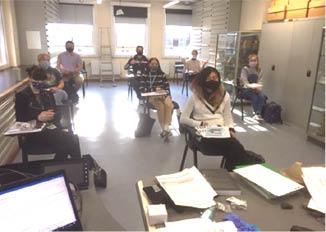
Small group student seminars in compliance with COVID-19 social distancing regulations (Source: photograph by Bill Sillar)
As I write now in the mid-summer, we have emerged from our third national lockdown. Following the UK government’s roadmap for the easing of COVID-19-related restrictions, access to the Institute building was reinstated on a limited basis, enabling staff and students to undertake face-to-face practical learning activities. ‘Outside’ our student UK fieldwork has recommenced, subject to approval of individual risk assessments (Figures 2 and 3). Archaeology South-East (ASE) activities in support of the construction sector have continued, with fieldwork being undertaken following established UCL/ASE COVID-19 risk assessments, which remain under constant review.
Despite these challenges, students and staff continue to be impressively productive. We are proud to remain ranked third in the subject in the QS World Rankings and second in the UK in The Guardian newspaper’s University Guide 2021 League Table of the 44 institutions teaching archaeology. We maintain an unparalleled range of expertise and are currently running nine staff recruitment exercises. Below, I present a selection of activities undertaken in the 2020–21 academic year, reflecting the continuing breadth in our teaching, research and engagement with the wider world. We look to a fuller re-opening/return to campus for 2021–22 and a re-establishment of some form of normality.
This year UCL signed a long-term strategic partnership with the National Trust to help conserve their historical sites and address important heritage challenges. Focusing on the National Trust’s properties, land and collections in England, Wales and Northern Ireland, the partnership will see staff from the Trust and UCL sharing resources and expertise to explore critical issues, including heritage science, sustainable conservation and cultural value. The first year of the partnership will involve a number of UCL academic secondments across the National Trust to explore areas of mutual interest and co-design a programme of research. The UCL Centre for Critical Heritage Studies, based at the Institute, is refocusing its Small Grants Scheme; this will fund projects that lead to, or support, collaborative research between the UCL and the National Trust on critical heritage studies as part of this new partnership.
We continue to invest very substantially in our facilities, ensuring that we retain one of the best-equipped university-based archaeological science laboratories in Europe. For example, a new Laser Ablation-ICPMS for the analysis of trace elements in ceramics, glass, stone and slag inclusions in iron was acquired in 2020, alongside a portable Raman spectrometer and new x-ray cabinet to add to our existing in-house facilities for the analysis of stone, ceramic and pigments and organic media. A dedicated optical microscopy lab for metallography and petrography, with research-grade microscopes, has been established and we have acquired start-up equipment for a new experimental taphonomy facility. Further equipment acquisitions have expanded our field survey capabilities. Concurrently we received significant funding from the Faculty of Social and Historical Sciences to acquire mass spectrometer equipment for our shared use as a partner in the Bloomsbury Environmental Isotope Facility.
In May, we held a virtual strategic planning day for all staff. Topics covered were ‘Then and now’: seven years since the last Institute awayday; the implications of the Institute’s disciplinary rankings; issues of inequality, diversity and inclusion; de-complexifying our teaching programmes; managing our workloads; and research priorities. It was an informal and informative opportunity to take stock after a year of lockdown and to consider our future strategies.
Looking to the near future, we have commenced recruiting the first new post to deliver our new BA Heritage, a flagship multi-disciplinary programme for UCL’s new campus at the Queen Elizabeth Olympic Park. This will be UCL’s first undergraduate heritage programme (projected to commence in September 2023) and is informed by the Institute’s internationally renowned postgraduate programmes in conservation, heritage and museum studies.
The BA Heritage is an interdisciplinary, future-facing degree that will train students in the core theories, methods and practical skills of heritage studies. It is a collaboration between three world-leading departments within UCL’s Faculty of Social and Historical Sciences: the UCL Institute of Archaeology (lead/home department), UCL Anthropology and UCL Department of Geography. It will be taught in collaboration with V&A East, utilising new facilities and collections on the Queen Elizabeth Olympic Park site. Students will be encouraged to apply their studies to pressing global challenges of our time, including climate change, sustainability, conflict, migration and social inequality, and to explore how heritage can contribute to the building of better future worlds. The degree will be housed in the new Marshgate building at UCL East (Figure 4), with state-of-the-art specialist object-based learning facilities and conservation and media laboratories. Many congratulations to the Institute team of Rodney Harrison, Rachel King and Tina Paphitis who have successfully steered us to this point.
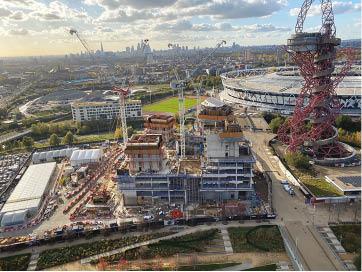
View of the Marshgate building at UCL East, with the Arcelor Mittal Orbit tower, the London Stadium and London in the background, November 2020 (Source: photograph by UCL East, Marketing)
Promotions, new academic staff and leavers
The Institute is pleased to announce the success of Carolyn Rando, Mark Lake, Bill Sillar and Tim Williams in UCL’s Senior Academic, Research and Teaching Promotions. Carolyn has been promoted to Associate Professor while Mark, Bill and Tim have all been promoted to Professorships (promotions effective 1 October 2021).
We have welcomed Miguel Carrero Pazos, a new Marie Sklodowska-Curie Research Fellow, who will join us for two years to undertake research on his project MegaScapes: Comparative Models of Megalithic Landscapes in Neolithic Atlantic Europe, Sarah Stark, Associate Lecturer (Teaching) in Bioarchaeology and Forensic Anthropology, to support the department’s significant student cohort in this area, Georgia Andreou, Associate Lecturer (Teaching) in Near East Archaeology, to provide teaching replacement for Mark Altaweel (who has taken on the role of SHS Faculty Vice-Dean (Enterprise)) and Rowan Gard, a Research Fellow, to work with Rodney Harrison on his project Re-imagining Museums for Climate Action.
In addition to research staff whose projects and limited period Fellowships have come to their end – Maria Dikomitou, David Francis, Enora Gandon, Francesca Guiducci, Rebecca Kearney, Hana Morel and Peter Schauer – we were also sad to say goodbye to fixed-term teaching staff Georgious Alexopoulos, Evi Baniotopoulou, Tina Paphitis, Sarah Stark and Misa Tamura, who have all worked tirelessly to support museum and heritage studies, and archaeological sciences and conservation. We will also greatly miss professional support staff members Ally Chan, Susan Sandford Smith and Hannah Williams, who have been absolutely excellent in their various positions. We thank all of them for their service to the Institute and UCL.
In line with UCL’s Teaching Concordat, introduced in October 2020 to improve UCL’s offering to teaching staff, Associate Lecturers/Lecturers (Teaching) – previously known as Teaching Fellows – Jill Saunders, Borja Legarra Herrero and Rebecca Watts have been moved to permanent, open-ended contracts. The Institute has a clear, ongoing need to retain these posts and the commitment of these staff to our teaching provision in their respective subject areas is greatly appreciated.
Awards and recognition
Institute staff, honorary associates and students continue to be recognised, both individually and for specific projects, through an impressive array of awards and esteem indicators, including significant media interest and publication in high-profile journals.
The Arts and Humanities Research Council’s (AHRC)-funded Egypt’s Dispersed Heritage project, co-developed by Alice Stevenson and Heba Abd El Gawad, was awarded a medal of achievement from Misr University for Science and Technology (MUST) in Cairo. Heba accepted the award on behalf of the project in December 2020, following an invitation to present at a day-long conference devoted to the project. Working in partnership with five UK museums and a series of Egyptian comic artists, graphic designers, community schools and educators, Egypt’s Dispersed Heritage has sought to reconnect Egyptian communities with Egyptian collections removed by British archaeologists.
Corisande Fenwick (Figure 6) has been elected Director of the Society for Libyan Studies, the leading UK institution for North African studies in the social sciences and humanities. Corisande currently co-directs four fieldwork projects with Moroccan, Tunisian, British and German colleagues in the region at the UNESCO site of Volubilis and in the Wadi Draa in Morocco, and at Bulla Regia and the Medjerda Valley in Tunisia. Corisande has served on the Council of the Society for Libyan Studies since 2014 and as Honorary Secretary since 2016.
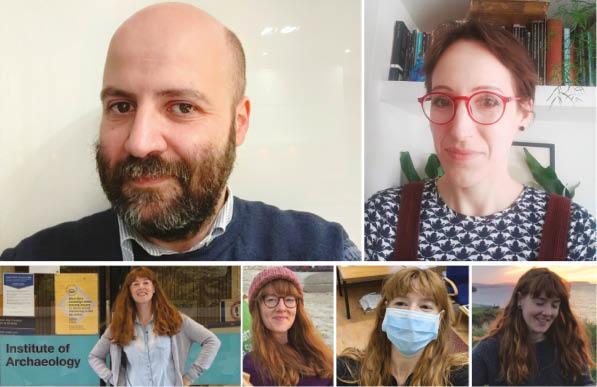
(Top left) Borja Legarra Herrero; (top right) Jill Saunders; (bottom) Rebecca Watts (Sources: photographs by Borja Legarra Herrero, Jill Saunders and Manoela Dantas Gomes)
ASE’s discovery of the Red Lion Playhouse was chosen to be in the Top 10 Archaeological Discoveries of 2020 by Archaeology Magazine.
Martin Bridge was commissioned by Historic England to undertake an analysis of timbers uncovered during the refurbishment of a shop premises in north London. He dated the building to the Middle Ages (fourteenth century).
Kevin MacDonald was invited to join a new Sky History series ‘Strangest Things’ as one of the programme’s team of experts. The series deals with controversial and puzzling objects. In some ways it is a twenty-first-century updating of Animal, Vegetable and Mineral, a renowned early television series on which Institute staff members appeared.
David Wengrow was invited to give a keynote lecture as part of the Dumbarton Oaks Symposium ‘Faces of Rulership in the Maya Region’ in March 2021. David’s lecture, entitled ‘Towards a New Framework for Comparing Ancient and Modern Forms of Social Domination’ (or ‘Why the State Has No Origin’), explored a new approach to understanding systems of extreme inequality and their development in human societies. The lecture was based on ideas presented in his forthcoming book, with the late anthropologist David Graeber, The Dawn of Everything: A new history of humanity .
Dean Sully presented an invited Masterclass Programme at the Max Planck Institute for the History of Science (MPIWG) in Berlin in September 2021. The programme, Heritage Conservation as Historical Method, presented a transdisciplinary approach to decolonising, transcultural, critical heritage and post-humanist practice as a research lens for writing histories of science. This follows on from Dean’s long-term collaborative projects to decolonise conservation and his work on the future challenges facing conservation and heritage projects.
Corinna Riva has recently been elected as membro estero (member abroad) of the Istituto Nazionale di Studi Etruschi ed Italici, the Italian national body that promotes Etruscan archaeology.
A new study, led by UCL Institute of Archaeology researcher Rahil Alipour and published in the Journal of Archaeological Science, has discovered that chromium steel – similar to what we know today as tool steel – was first made in Persia nearly a millennium earlier than previously thought.
Collaborative research published in Antiquity, led by Honorary Research Fellow Garrard Cole and involving Andrew Reynolds and Tony Waldron, presented the first archaeological evidence for intentional facial mutilation from Anglo-Saxon England.
A global study of ancient dog DNA, published in Science by scientists at the Francis Crick Institute, with Miljana Radivojevic from the Institute, provided new insights into the early history of dog populations and their relationships with humans and each other.
Simon Parfitt and Matthew Pope contributed to the collaborative study of Neanderthal teeth, published in the Journal of Human Evolution. The teeth were originally discovered at the site of La Cotte de St Brelade, Jersey, in the early twentieth century; they exhibit features that hint at interbreeding with modern humans. The wider project and the ASE team at work can be viewed at https://vimeo.com/466177482
A collaborative research team led by Mike Parker Pearson found a dismantled stone circle in west Wales which they believe was moved to Salisbury Plain and rebuilt as part of Stonehenge. The discovery, published in Antiquity, was the subject of an exclusive BBC programme, Stonehenge: The lost circle revealed, broadcast in February 2021.
International collaborative research involving Dorian Fuller and published in PNAS has shown that people have shaped their natural environment for at least 12,000 years. The collaborative research project ArchaeoGLOBE, also involving Mark Altaweel, mapped human populations and land use around the world, showing that global patterns of land use track long-term patterns of societal change.
New research published in the journal PLoS ONE provides the first glimpse inside one of the giant sarsen stones at Stonehenge. The study, led by researchers at the University of Brighton and involving expertise from the Institute, has revealed new insights into the geology and chemistry of the stone, showing how it originally formed before being moved into place at the monument during the Neolithic period.
A new study, published in the Journal of World Prehistory, co-authored by Miljana Radivojevic, offers an exhaustive synthesis on the origins, evolution and societal impact of Balkan metallurgy over nearly 3,000 years. The study, undertaken with Benjamin Roberts (Durham University), looks at archaeometallurgical and archaeological evidence that crosses national boundaries and languages of all the Balkan Peninsula states.
Student news
The past academic year saw an exciting new development in the area of Mediterranean archaeology at the Institute: the establishment of an International Doctoral Cluster (IDC) with the University of Toronto (UoT), led by David Wengrow, Eva Mol and Giacomo Fontana (graduate representative) for UCL and by Carl Knappett and Moizza Elahi (graduate representative) for UoT. With travel not yet possible, the IDC began life online with seminars on the topics of mountain landscapes as sites of political resistance and on the cross-cultural transmission of images. Over the coming years, there will be opportunities for student exchanges at PhD level and support for collaborative projects, representing a significant boost to the Institute’s activities in this area. The initiative is supported by UCL’s Global Engagement Fund.
We have taken the opportunity presented by our new partnership with Butser Ancient Farm in Hampshire to address the legacy and identity of the Institute’s long-running Experimental Archaeology course. We have renamed it Archaeo-Tech to better express the full scope of our teaching and partnership with Butser Ancient Farm. The new name also reflects our desire to take the skills, expertise and perspective that experimental archaeology brings to address broader contemporary social and environmental issues.
University Archaeology Day (UAD) is now in its fourth year. This free event is designed for prospective students, teachers and parents to learn about the many degree programmes on offer across the UK, to discover the huge range of career opportunities that an archaeology degree can lead to and to hear about some of the latest archaeological research. UAD 2020 took place online in October, while 2021 marked the first Postgraduate University Archaeology Day which took place, again online, on 28 April.
Institute staff and students took part in UCL’s Undergraduate Virtual Open Days which took place from 7 to 18 June. The virtual events included live interactive sessions, in which participants had the unique opportunity to speak to admissions staff and academic tutors and interact with current students and alumni to find out what studying at UCL is really like.
Several Institute Undergraduate and Graduate Diploma students were awarded Departmental Prizes for the 2020–21 academic session, both in specialist subject areas and also for their outstanding contributions to the life and work of the Institute.
Masters students were awarded Departmental and Faculty Prizes for the 2019–20 academic session (January 2021).
Institute research student Amanda Ford Spora was awarded funding from the UCL Engagement Train and Engage scheme for her project co-producing a Manga_Zine with Teens Using Digital Replicas of Ancient Objects.
ASE has documented the placement year of Alex Allen, who is taking our BA Archaeology with a Placement Year degree, in a series of blog posts:
Funding awards for new research
Several of our staff had their outstanding international research activities recognised by external funding and institutional awards. A small selection is mentioned here.
Stephen Shennan is contributing to a new ERC Synergy project combining prehistoric human genomic, archaeological, environmental, stable isotope and climate data to understand better the processes that shaped our biological and cultural past – COREX: From Correlations to Explanations: Towards a new European prehistory. The project brings geneticists and archaeologists from UCL (led by Mark Thomas from the Department of Genetics Evolution and Environment and Stephen at the Institute) together with archaeologists from Gothenburg (led by Kristian Kristiansen and Karl Göran Sjögren) and geneticists from Copenhagen (led by Kurt Kjær, Eske Willerslev and Fernando Racimo).
As briefly mentioned in my report last year, the Institute is a partner in the EC-funded MSCA-ITN ‘PlaCe’ (Training the Next Generation of Archaeological Scientists: Interdisciplinary studies of pre-modern plasters and ceramics from the eastern Mediterranean). This €4-million Marie Sklodowska-Curie Innovative Training Network, running from 2021 to 2025 and involving eight universities and research centres from five countries, will train Early Stage Researchers to conduct state-of-the-art, science-based research on the technology, use and provenance of the most abundant materials in archaeological sites.
A joint bid to the AHRC Capability for Collections fund (CapCo) from the Institute with the UCL Institute for Sustainable Heritage and UCL Culture was awarded funding. This funding will enable UCL to invest in three new hyperspectral imaging (HSI) cameras to upgrade existing imaging capability at the Institute for Sustainable Heritage and in three portable x-ray fluorescence (pXRF) instruments to replace our existing equipment. Institute researchers have used pXRF equipment at Emperor Qin Shihuang’s Mausoleum in China since 2014. Here they have analysed the ceramic statues of the Terracotta Army and bronze weapons unearthed with them at this UNESCO World Heritage Centre.
Corinna Riva has been awarded a one-year Fellowship by the University of Erfurt Max-Weber-Kolleg, Germany, to undertake research on ‘Citizenship and Religion in First-Millennium BC Mediterranean: Etruria and Iberia’. The funding will provide a teaching replacement in her absence.
Elizabeth Graham is contributing expertise to a UKRI National Interdisciplinary Circular Economy Centre for Mineral-Based Construction Materials, which has won EPSRC funding (2021–24). The project is led by Julia Stegemann from UCL Civil, Environmental and Geomatic Engineering, together with colleagues from the UCL Faculty of Laws, the Bartlett School Environment, Energy and Resources and the Bartlett School of Sustainable Construction, as well as the Institute.
Additionally, we have been successful in obtaining Leverhulme Trust funding for two projects: Evaluating the Cultural Cost of Development in the new South Africa, led by Rachel King (Figure 7), and Unlocking Records of Past Permafrost Thaw Through Isotopes of Fossil Bones, led by Rhiannon Stevens with co-investigators from the universities of Leeds and Sussex (Figure 8).
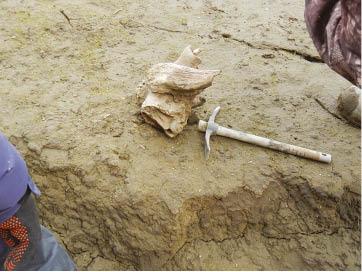
Muskox skull, Siberia (Source: photograph by Julian Murton, Project Collaborator at the University of Sussex)
We regularly obtain small external grants and grants-in-kind to support collaborative research, fieldwork and post-excavation analyses and capacity building/impact activities. In 2020–21 these included:
Emborio Hinterland Project led by Andrew Bevan (Society of Antiquaries Research Grant)
Building Capacity and a National Strategy for North African Studies led by Corisande Fenwick (Society for Libyan Studies)
An International Glass Trade: Establishing the Origins of the Coloured Glass in the Early Stained Glass Windows of Canterbury Cathedral led by Ian Freestone (British Academy/Leverhulme Small Grant)
Pre-Colombian Agriculture on Puerto Rico: A Direct Archaeobotanical Approach led by Dorian Fuller and Institute research student Julian Garay-Vazquez (Figure 9) (NEIF–NERC)
Piety, Power and Representation: A New Type of Church Architecture in a Fortification Context in Late Medieval North Africa led by Claudia Naeser (Society for Libyan Studies Research Grant).
We also had further UCL institutional small grant funding successes this year, including:
Protecting and Promoting Heritage: Establishing a New Cultural Social Enterprise in Cyprus led by Mark Altaweel (UCL Knowledge Exchange and Innovation funding)
Rapid Quantification of Archaeological Pottery for Chronology and Typology led by Andrew Bevan (UCL SHS Dean’s Strategic Funds)
Mammoth Projects: Amplifying the Archaeology of Early Humans in London Communities led by Matt Pope (UCL SHS Dean’s Strategic Funds)
Rise of Metallurgy in Eurasia (monograph completion) led by Miljana Radivojevic (UCL SHS Dean’s Strategic Funds)
Fuel (R)Evolution in the Eurasian Landscape: Accessing Relationship between Metal Technology and Carbon Emissions in the Bronze Age led by Miljana Radivojevic and Dorian Fuller (UCL SHS Dean’s Strategic Funds).
Monograph and digital resource publications
Please see ‘Bookshelf’ for a fuller list of recent Institute of Archaeology monograph publications. Here I have picked out a sample to contextualise our institutional output and touch upon the breadth of the Institute’s published works. Many of these are definitional of new approaches and the culmination of large-scale projects. These include:
The first of four volumes resulting from the collaborative Stonehenge Riverside Project led by Mike Parker Pearson entitled Stonehenge for the Ancestors. Part 1: Landscape and monuments (Sidestone Press, 2020). This six-year project (2003–9) was a collaborative enterprise directed by six academics from five UK universities, which aimed to investigate the purpose of the unique prehistoric monument of Stonehenge by considering it within its wider archaeological context and contemporary landscape.
A two-volume study by Ruth Whitehouse (Emeritus Professor), myself and colleagues entitled Neolithic Spaces (Specialist Studies on Italy series; Accordia Research Institute, 2020). The study represents the culmination of substantial fieldwork funded by the British Academy, the UCL Institute of Archaeology and the National University of Ireland Galway (2002–10). Together the volumes provide a large-scale synthetic survey of the Neolithic sites (villaggi trincerati, ‘ditched villages’) of the Tavoliere plain, southeast Italy, one of the most important regions in the world for the scale of early Neolithic settlement. Volume 1, Social and Sensory Landscapes of the First Farmers of Italy, additionally introduces new methods of sensory archaeology that have wide applications in archaeology as a whole. Volume 2, The Bradford Archive of Aerial Photographs by Mike Seager Thomas, provides a significant, interpreted resource of aerial photographs, maps and ground-truthed material for the ditched villages.
Matt Pope, Simon Parfitt and Mark Roberts’ The Horse Butchery Site: A high resolution record of Lower Palaeolithic hominin behaviour at Boxgrove, UK (Spoilheap, 2020). The Boxgrove Horse Butchery Site began as a small test pit, excavated in 1988. However, it rapidly became clear that the site comprised a significant discovery of a preserved land surface with in situ clusters of flint artefacts sealed by intertidal silts. This land surface preserved the butchered remains of a large female horse and provided an exceptional opportunity to study what appeared to be a hominin group working together to butcher a single animal. The volume presents the first integrated analysis of this exceptional site.
Heritage Futures: Comparative approaches to natural and cultural heritage practices (UCL Press, 2020), by Rodney Harrison, Caitlin DeSilvey, Cornelius Holtorf, Sharon Macdonald, Nadia Bartolini, Esther Breithoff, Harald Fredheim, Antony Lyons, Sarah May, Jennie Morgan and Sefryn Penrose. This is the culmination of a four-year collaborative international research programme (2015–19) based at the Institute. Led by Rodney Harrison, the programme was funded by an AHRC ‘Care for the Future’ Theme Large Grant. This book offers a fresh perspective on heritage studies by overturning the focus from the past to the future.
Synthetic volumes, incorporating new perspectives, from staff in the World Archaeology section include:
Corinna Riva’s new volume A Short History of the Etruscans (Bloomsbury, 2020). The book explores the Etruscan language, which long remained wholly indecipherable, the Etruscan landscape and the sixth-century growth of Etruscan cities and Mediterranean trade.
Corisande Fenwick’s Early Islamic North Africa: A new perspective (Bloomsbury, 2020), in which she proposes a new approach to the Arab conquests and the spread of Islam in North Africa. She argues that the establishment of Muslim rule coincided with a phase of intense urbanisation, new architectural forms (mosques, housing, hammams), the spread of Muslim social and cultural practices, the introduction of new crops and manufacturing techniques and the establishment of new trading links with sub-Saharan Africa, Europe and the Middle East.
Bethany Walker, Timothy Insoll and Corisande Fenwick’s The Oxford Handbook of Islamic Archaeology (Oxford University Press, 2021). The edited volume surveys the field of Islamic archaeology on a global scale and includes previously unpublished recent fieldwork.
ASE staff have similarly brought their expertise to new synthetic monographs. Andrew Margetts’s The Wandering Herd: The medieval cattle economy of South-East England c.450–1450 (Oxbow Books, 2021) is the first detailed look at the development of cattle husbandry and specialised cattle farming in South-East England throughout the medieval period.
Works of wide relevance by Institute staff on new frameworks of thought and engagement include Rachel King’s publication, co-edited with Chris Wingfield and John Giblin, The Pasts and Presence of Art in South Africa: Technologies, ontologies and agents (Cambridge McDonald Monograph series; McDonald Institute for Archaeological Research, 2020). This volume establishes a new framework of analysis, transcending that of nineteenth-century colonial power, for engaging with South Africa’s artistic traditions.
Other recent edited volumes and journal special issues that variously draw on our expertise and leadership across our three Institute sections of heritage studies, archaeological sciences and world archaeology include:
Heritage Conservation and Social Engagement , edited by Renata Peters, Iris L. F. den Boer, Jessica S. Johnson and Susanna Pancaldo (UCL Press, 2020). This open-access volume explores different kinds of social engagement motivated by the practice of heritage conservation, especially in areas of the world where heritage and museum collections show potential to be used as tools for social empowerment. The topics and ideas discussed were introduced in the 2014 conference ‘The Social Impact of Cross-Disciplinary Conservation’, organised by the UCL Conservation and Development Research Network (CDRN) and supported by funding from a UCL Grand Challenges Small Grant (Intercultural Interaction) and the Institute.
Deterritorializing the Future: Heritage in, of and after the Anthropocene , edited by Rodney Harrison and Colin Sterling (Open Humanities Press, 2020), which focuses on how pasts resource presents and is a fundamental step towards building alternative futures in the Anthropocene. The work brings together scholars from a range of disciplines and connects contemporary developments in the post-humanities with the field of critical heritage studies.
A forthcoming special issue of the journal Sustainability , with Theano Moussouri (Figure 10) as guest editor, on the latest theoretical ideas and methodological approaches to examining the relationship between food heritage and sustainable food choices and its role in tackling global challenges.
Andrew Gardner, together with Manuel Fernández-Götz, Guillermo Díaz de Liaño and Oliver J. T. Harris, has produced a Special Section of the Cambridge Archaeological Journal 31, no. 3 (2021) entitled Debating Posthumanism in Archaeology .
New initiatives
Last year I announced a new UCL Institute of Archaeology PhD series, published by BAR, which allows for rapid publication of largely unaltered Institute PhD theses. I am pleased to report that to date five volumes have been published on diverse subjects, from medieval whaling to ancient Maya settlement to gender roles and relations in the Aegean Bronze Age.
Events
As part of our commitment to provide an outstanding research environment for staff, students and visitors, the Institute hosts and organises numerous events on many different aspects of archaeology and is linked to other heritage institutions, archaeological societies and organisations.
The Term I Institute Research Seminars normally highlight current Institute research, while the Term II series is concerned with a thematic topic. In 2020–21 the thematic series (January–March 2021) was concerned with Silk Roads Archaeology. Further details of Institute seminar series and other events are available here: https://www.ucl.ac.uk/archaeology/news-events/events. A selection of events over the past academic year, most of which took place online, is highlighted below.
October 2020
An international conference to mark the conclusion of the EC-funded CHEurope training network took place online. The 15 Early Stage Researchers, funded by the Marie Sklodowska-Curie Innovative Training Network, as well as academic staff supervisors and various renowned international keynote speakers offered a renewed vision of the place that cultural heritage occupies in our societies and the role it can play in future developments.
The AHRC Heritage Priority Area team organised a half-day virtual event on inclusivity and community within policy and practice, with a focus on heritage and planning.
November 2020
The Institute’s History of Archaeology Research Network launched a series of online interviews, beginning with Nicole Cochrane.
The Institute’s Ceramic Technology Research Network also launched a series of online seminars, beginning in November:
Thermo-mechanical Performance of Ceramics and their Versatile Functions: Anno Hein (Institute of Nanoscience and Nanotechnology, NCSR ‘Demokritos’, Athens)
Technological Analysis of Capacha Pottery from the Colima Valley, Western Mexico: Carlos Salgado-Ceballos (Universidad Nacional Autónoma de México (UNAM))
Goods from the Wine-Dark Sea: East Mediterranean Ceramic Imports in Egypt during the Late Bronze Age: Valentina Gasperini (French Institute of Oriental Archaeology (IFAO), Cairo).
Following a short hiatus, the Institute’s Soundcloud podcast series (#Remote not Distant: UCL Institute of Archaeology Podcasts) continued with informal interviews between Charlotte Frearson and staff and students, as well as UCL colleagues. It included a special series to mark Women’s History Month in March.
February 2021
The 8th Annual Maya Workshops, Maya on the Thames took place online.
Renata Peters was one of the organisers of an inclusive online event which explored processes of care and participation in living heritage and performative practices: Heritage, Participation, Performativity, Care. Co-hosted with UCL History of Art and organised in association with the Institute’s Centre for Critical Heritage Studies, the event was directed at prompting new forms of discourse, compassionate exchange and affective relations.
May 2021
Institute of Archaeology staff, students and alumni took part in a special Q&A event in May 2021 exploring the real events of Sutton Hoo that inspired the BAFTA-nominated film The Dig. The panel discussion, organised by the UCL Faculty of Social and Historical Sciences and chaired by its Dean, Professor Sasha Roseneil, reviewed the real events of Sutton Hoo that inspired the film. She considered the balance between historical accuracy and dramatisation, the ways in which archaeology is represented in the popular media and on television and how the team accessed British Museum archive material to recreate the burial. This popular online event attracted approximately 400 attendees.
June 2021
Elizabeth Baquedano organised the Sixth London Nahuatl Study Day in June 2021. The online event began with a keynote lecture by Dr Jerry Offner, Houston Museum of Natural Science, entitled ‘Defender of our lands! Five centuries with the living codex of Cuaxicala, Puebla, Mexico’. It was followed by an Aztec hieroglyphs workshop for beginners on Saturday 5 June and a Nahuatl language workshop for beginners on Sunday 6 June.
To coincide with International Museums Day in November 2020, the Reimagining Museums for Climate Action project team (funded by the AHRC and led by Rodney Harrison, with Colin Sterling, formerly Institute of Archaeology, now University of Amsterdam, and Henry McGhie of Curating Tomorrow) launched a competition for proposals for different ways in which museums might be reimagined to address the climate emergency. Designers, architects, academics, artists, poets, philosophers, museum professionals and the public were challenged to radically (re)imagine and (re)design the museum as an institution, to help bring about more equitable and sustainable futures in the era of climate change.
The competition received more than 250 submissions from 48 countries. The eight winning proposals (from all over the world, including the United States, Singapore and Brazil, as well as the UK) were curated by the project team to form an online exhibition to be displayed at the Glasgow Science Centre. It opened in June and remained in place until November, when Glasgow hosted COP26, the United Nation’s Climate Change Conference.
A virtual exhibition on the history of eugenics featuring the work of staff and students from the Institute, as well as the Sarah Parker Remond Centre for the Study of Racism and Racialisation, was launched in summer 2021.
Recognition of teaching and support
Institute staff continue to be recognised for their outstanding contributions to the learning experience and success of UCL students, and were nominated in the 2021 Student Choice Awards.
Outreach and public engagement
ASE has embarked on a new initiative to bring the deep past of London alive for schoolchildren and the wider communities in the City. PalaeoLondon , supported by the UCL Faculty of Social and Historical Sciences Dean’s Strategic Fund, is working with educators across north London boroughs to develop resources and activities for young people. ASE’s Matt Pope and Letty Ingrey are working alongside Ice Age specialists Tori Herridge and Annemieke Milks, in partnership with UCL East’s Culture Lab and UCL Anthropocene, to develop the networks and materials needed to make an impact.
ASE has established a series of podcasts – Digs Deeper! – in which new archaeological discoveries can be discussed, archaeologists can talk about their day-to-day roles, the archaeological process can be demystified or issues affecting the development-led archaeology sector can be tackled.
ASE also launched a new digital outreach project, ASE Spotlights, in 2020. Short videos are planned to give insights into archaeological life and practice at ASE, starting with an office tour.
The Institute’s student exhibition, a virtual exhibition entitled ‘Let’s Play: Games as Connection’, was launched in May 2020 and ran until April 2021. It showcased a variety of games from across the globe, illustrating the universal nature of games no matter the cultural background.
Brenna Hassett was interviewed for Stylist magazine about the increasing interest in all things archaeological on TikTok. Brenna strongly supports making the field of archaeology accessible to new audiences, especially women and girls.
Kris Lockyear has been documenting his community archaeology geophysics project in an online blog, with interesting results being uncovered this summer from Verulamium.
Elizabeth Baquedano (Honorary Associate Professor) was interviewed for an article in The Independent about the fall of the Aztec Empire.
Institute news regularly features on the UCL news site, including the article headlines quoted below.
October 2020
Archaeological find reveals startling Anglo-Saxon custom
November 2020
Stonehenge builders only distantly related to modern Britons
February 2021
Jersey Neanderthal teeth point to breeding with Homo sapiens
Alumni and former staff
Another year also brings with it great sadness. Institute staff, students, friends and colleagues were saddened to hear of the deaths of several alumni and friends, including Heather Bell, Adrian Challands and Simon Keay. Short pieces to commemorate these individuals are included in the Obituaries section of this issue, but here I would like to mention the following:
Lisette Petrie, who passed away on 5 April 2021 after a full life of dedication to family, friends and the world of learning. Her ties to UCL were through her grandfather, the archaeologist Flinders Petrie (1853–1942), whose Egyptian and Palestinian archaeological collections form such an important part of UCL museums and collections today.
We were immensely saddened by the death of our esteemed colleague Tony Waldron in January 2021. Tony gave many, many years of selfless service to the Institute as Honorary Professor. He was an integral member of the bioanthropology community of staff and students on the third floor and was responsible for the coordination and teaching of two courses on the MSc in Bioarchaeological and Forensic Anthropology. The Tony Waldron Prize in Bioarchaeology has been established in his memory. As his wife Gill indicated, ‘Tony was always very keen to support and encourage students in their academic work, and so an award in his name feels absolutely appropriate. The Tony Waldron Prize in Bioarchaeology will be awarded annually to a student graduating with a Master’s Degree.’
Concluding remarks: looking forward to the future
In short, over the past year, we have developed new ways of working, teaching and undertaking research, all reinvigorated by a range of challenges. I am deeply grateful for everyone’s contribution. In addition to all the activities outlined above, we completed two foremost institutional tasks. We submitted our Research Excellence Framework (REF) for 2014–20 – a very substantial undertaking led by James Steele that we believe makes a powerful case for the high-research quality and intensity at the Institute. For this REF period Institute staff authored or edited 100 books, including journal special issues, 1,104 journal articles and 429 book chapters and proceedings papers (plus a large number of commissioned professional reports and digital resources).
We also applied for an Athena SWAN (Scientific Women’s Academic Network) Bronze Award (led by Corisande Fenwick with Louise Martin and Kelly Trifiló as Deputy Leads). Athena SWAN recognises organisations’ commitment to, and progress on, equality, diversity and inclusion (EDI), particularly race and gender in higher education. We have a long-established focus on EDI issues (notably led by Carolyn Rando and Charlotte Frearson) and the Institute of Archaeology’s Women’s Forum. This has been reinforced in 2020 by the constitution of a new departmental EDI Committee directly reporting to our Senior Management Team, together with a student-led Forum (currently led by post graduate researcher Julian Garay-Vazquez).
More widely, archaeology as a subject area has faced its own challenges over the past year, with the downgrading or closures of academic departments and a proposed cut in government funding, now averted. We were deeply concerned to hear news of cuts from Sheffield, Chester, Worcester and Sligo in Ireland. In May I wrote to the Vice Chancellor of the University of Sheffield regarding the potential closure of its Department of Archaeology. In my letter I highlighted both the importance of the subject area and Sheffield’s distinctive and world-leading expertise within it.
Archaeology allows us to take part in debates of critical importance to the future such as the origins of the human species, the impact of long-term environmental and climate changes on the planet and human societies, the role of the human past in shaping current perceptions of gender and race, and the public roles and responsibilities of museums and heritage organisations. Archaeology is central to the development of the UK and international heritage and tourism industries, and is the only social science that offers a deep-time perspective for isolating key issues of sustainability. UK archaeology has an enviable global reputation, fostered by the network of teaching and research spread through a number of universities, to which Sheffield has been a major contributor.
Although uncertain times remain on the horizon, we will continue to work together to ensure the Institute remains a stimulating and inclusive research and teaching environment, with people at its centre. As I look towards my last academic year as Director, I am as committed as ever to supporting all members of the Institute community, of whom I am immensely proud. We are leading a discipline that uses the past for the betterment and support of the future. We are a large, exceptional community of students, scholars and professional services staff that continues to put people first.


